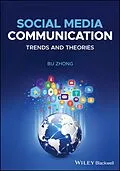Examines the social media mechanism and how it is transforming communication in an increasingly networked society
Social Media Communication: Trends and Theories explores how social media is transforming the way people think and behave. Providing students with an in-depth understanding of the mechanism underlying social media, this comprehensive textbook uses a multidisciplinary approach to examine social media use in a wide range of communication and business contexts. Each chapter is based on original research findings from the author as well as recent work in communication studies, neuroscience, information science, and psychology.
Divided into two parts, the text first describes the theoretical foundation of social media use, discussing the impact of social media on information processing, social networking, cognition, interpersonal and group communication, the media industry, and business marketing. The second half of the book focuses on research-based strategies for effectively using social media in communication and business such as the news industry, heath care, and social movements. Offering detailed yet accessible coverage of how digital media technology is changing human communication, this textbook:
* Helps readers make the best use of social media tools in communication and business practices
* Introduces more than a dozen theories in the areas of communication, psychology, and sociology to highlight the theoretical frameworks researchers use in social media studies
* Identifies a variety of trends involving social media usage, including the app economy and patient care
* Addresses the relation between social media and important contemporary topics such as cultural diversity, privacy, and social change
* Presents 14 imperative social media topics, each with the power to change the ways you see and use social media
Social Media Communication: Trends and Theories is the perfect textbook for undergraduate and graduate courses in communication, business, journalism, business, and information science and technology. It is also an invaluable resource for researchers, educators, journalists, entrepreneurs, and professionals working in media management, advertising, public relations, and business marketing.
Autorentext
BU ZHONG is Professor of Journalism and Communications, Donald P. Bellisario College of Communications, Pennsylvania State University, USA. His research centers on information processing mediated by digital media technology, particularly how judgment, decisions, and behavior may be altered by social media information. Before joining academia, Professor Zhong worked as a journalist for over a decade in Beijing, Washington D.C., and Atlanta.
Inhalt
Preface x
Part I Theoretical Foundation of Social Media Use 1
1 Why Study Social Media? 3
Overview 3
The Power of Social Media 4
Social Media in a Time of Distrust 4
The Us vs. Them Mentality 5
Digitization and Digitalization 5
Adoption Models of Media Technologies 7
Theory Highlight: Construal Level Theory 9
Summary 10
Looking Ahead 10
Discussion 10
References 11
2 Media Technology and Human Civilization 12
Overview 12
Definition of Social Media 13
Definition of Technology 15
Four Eras of Human Civilization 16
Theory Highlight: Technology Determinism 21
Summary 23
Looking Ahead 23
Discussion 24
References 24
3 Social Media and Computer-Mediated Communication 26
Overview 26
Social Change 27
Computer-Mediated Communication 27
Verbal and Nonverbal Cues 29
Interpersonal Communication 30
Uncertainty Reduction Theory 31
Social Information Processing Theory 32
ICT and Communication 32
Popularity of Social Media 33
Group Communication 34
Information Seeking 35
Theory Highlight: Uses and Gratifications Theory 36
Summary 37
Looking Ahead 38
Discussion 38
References 38
4 Social Media, Judgment, and Decision Making 42
Overview 42
Media Technology and Brain Activity 43
Judgment and Decision-Making Research 44
Selective Exposure 45
JDM and Social Endorsement 47
The Power of Social Context 49
Social Media for Patient Support 50
Theory Highlight: Cognitive Dissonance Theory 51
Summary 52
Looking Ahead 52
Discussion 52
References 52
5 Social Media and Behavior 55
Overview 55
Social Media and News Consumption 56
Social Media and Health Behavior 58
The Culture of Sharing 60
Knowledge Collaboration 61
Theory Highlight: Social Cognitive Theory 62
Summary 62
Looking Ahead 63
Discussion 63
References 63
6 Social Media and Privacy Concern 66
Overview 66
Internet Privacy Concern 67
Scholarly Perspectives Toward IPC 67
Four Epochs 68
Social Media Surveillance 69
Generation Gap in IPC 70
Privacy Concern at the Workplace 71
Privacy Risks and Coping Strategies 72
Theory Highlight: Need for Cognition 73
Summary 74
Looking Ahead 75
Discussion 75
References 75
7 Social Media and Culture 78
Overview 78
Cultural Diversity 78
Five Dimensions of Cultural Differences 80
Cultural Evolution 82
Cultural Influence on Social Media Usage 83
Cultural Differences in Social Media Activities 84
Theory Highlight: Cultivation Theory 85
Summary 86
Looking Ahead 86
Discussion 87
References 87
8 Problematic Use of Social Media 90
Overview 90
Warm Feelings in Social Media Use 91
Mechanism of PUSM 92
Reward System and Self-Control 94
FOMO and Phubbing 95
Cyber Troops and Social Media Manipulation 96
Relief of PUSM 99
Theory Highlight: Third-Person Effect 101
Summary 102
Looking Ahead 102
Dis...
